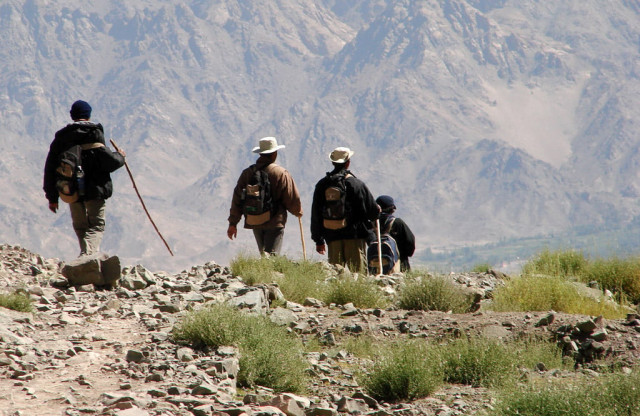Going up: ‘Women trekkers need more support’
Mountaineer moot discusses ways to increase access, popularity of sport.

Around 100 trekkers, adventurers and climbers from all over Pakistan attended the annual moot, which was organised by a volunteer-run Facebook community “Trekking Pakistan”. PHOTO: FILE
Trekkers Ayesha Masrur Khan and Sapna Jawid, both from Islamabad, had these suggestions for their peers as they shared details of their “first major trek” during the Trekkers Meetup 2013 at a local hotel on Sunday.
Around 100 trekkers, adventurers and climbers from all over Pakistan attended the annual moot, which was organised by a volunteer-run Facebook community “Trekking Pakistan” that provides Pakistani trekkers with an online platform to share experiences and coordinate expeditions.

Khan, an instructor at the National University of Sciences and Technology (NUST), and Jawid, a graduate student of engineering at the same university, were among three women who joined an 11-member expedition to Concordia — the gateway to four 8,000-metre peaks in the Karakoram, which lies at the confluence of Baltoro and Godwin-Austen glaciers — between August 23 and September 12, 2013.
“We expected the trek to be demanding but it turned out to be tougher than our expectations,” said Khan.
Nevertheless, she and Jawid, who are cousins, were able to cope with the physical harshness of the climb through their own will and the help of supportive male team members, who assisted them in maintaining pace during the trek. But it was the pre- and post-trek difficulties from a Pakistani woman’s perspective that both Khan and Jawid would like to end.
“First, we had to convince our families that we were serious and were not just going for the heck of it,” said Jawid. “The fear of being out of contact also multiplies for a woman, so we had to deal with that as well.”
Fortunately, their families were no strangers to trekking and supported the women. Based on their experience, Khan and Jawid believe a good support system, better coordination during the pre-trek phase, and encouragement from male peers would help more women take up trekking. Jawid said tourism companies could also help increase participation of female trekkers by giving expenditure subsidies and getting women trekking guides.
Just like Khan and Jawid, several other trekkers also shared their 2013 trekking experiences with the participants through presentations at the meet-up.
Sharing knowledge of new routes
Saad Mohammed, who was part of an all-Pakistani expedition which became the first-ever group to climb the 5,830-metre Koksil V peak this year, presented the details of the climb at the event.
Mohammed said the Koksil V peak is an ideal training peak and could be packaged as such for more Pakistani trekkers to go scale it.
Waqas Ashraf from Muzaffarabad informed the participants about the Babun valley, a hitherto undiscovered trekking route in Azad Jammu Kashmir, which is located at 3,800-metres and is accessible from Jagran Nala through Kundal Shahi.
There was more inspiration in store for participants as Dr Ahsan Akhtar, a polio-stricken veteran trekker from Faisalabad who started trekking back in 1985, urged Pakistani trekkers to explore untravelled treks of the Karakoram mountain range.
Akhtar’s presentation focused on five high-altitude passes of Snow Lake that range between 4,800 and 5,800 metres. Sokha La, Lukpe La, Khurdopin, Skam La and Sim La were the passes about which Akhtar told the participants.
Umair Hasan, one of the organisers, said the annual moot, which has been organised regularly since 2009, provides an opportunity for trekkers — most of whom are young professionals — to network, share technical and logistical knowledge of various trekking routes and plan for the 2014 expeditions.
Technical climbs could cost upwards of Rs40,000 per person per trip, but cheaper, low-altitude trekking trips are also possible, Hasan said.
Hasan said the Nanga Parbat killings incident in June has not affected domestic trekkers because the Pakistanis are aware of which routes are safe and which have security concerns.
Published in The Express Tribune, December 9th, 2013.












1724319076-0/Untitled-design-(5)1724319076-0-208x130.webp)






COMMENTS
Comments are moderated and generally will be posted if they are on-topic and not abusive.
For more information, please see our Comments FAQ